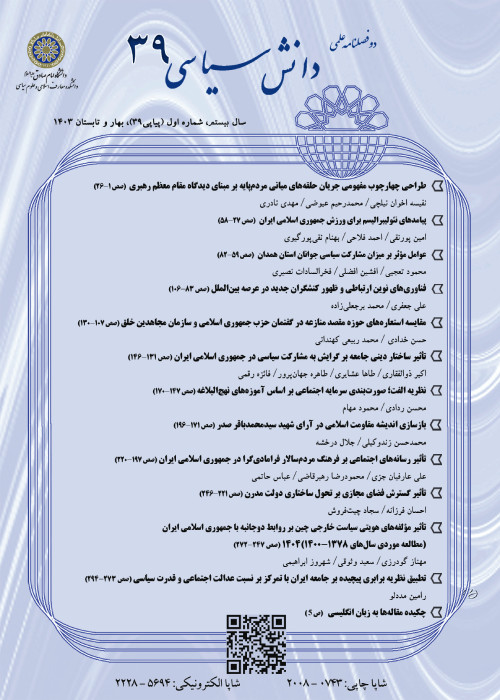A Comparative Study of Justice from the Perspective of Morteza Motahhari and Michael Walzer
Author(s):
Article Type:
Research/Original Article (دارای رتبه معتبر)
Abstract:
The current study is trying to present a comparative analysis of the pattern of justice between two thinking streams of “Neo-Sadraism” and “Communitarianism” based on Morteza Motahhari and Michael Walzer’s ideas. To achieve a pattern of justice based on these two thinkers’ ideas, three “philosophical” (including epistemology, anthropology, and ontology), “paradigmatic”, and “scientific” (including theory and model) types of knowledge are mentioned, with an attempt to analyze the collected data based on the comparative method. Therefore, after explaining the philosophical and paradigmatic knowledge of Neo-Sadra'i and Communitarian streams of thought, we have compared justice theory and the model of “infrastructure – superstructure” of Morteza Motahhari with “complicated equality” of Walzer in some parts such as “one's concept of justice”, “perception of validity from justice”, “relativism in justice”, “pluralism in the bases of justice’, and “the relation between individual and community’s rights in the implementation of justice”. The findings have shown that despite the shared ideas of these two thinkers in giving importance to the society and community in the perception of social blessings and the principles of their distribution, Morteza Motahhari gave priority to the community’s rights in comparison with the individual's, and also he disagrees with the maximum relativism and pluralism in blessings and the principles of their distribution, and – unlike Walzer’s approach – he believes in the existence of some constant and universal perceptions in justice. On the other hand, by counting eleven minor domains of justice (membership, security and welfare, money and commodities, office, hard work, leisure, education, kinship and love, divine grace, recognition and formalization, and political power), Walzer considers the preservation of interdependence in each domain from “domination” and “monopoly”, but Morteza Motahhari, by mentioning three general domains of justice (divine, individual, and social) indicates an effective comprehensive relation among them, with divine justice as the infrastructure for human justice, and the individual justice as a superstructure for social justice.
Keywords:
Language:
Persian
Published:
Political Knowlwdge, Volume:14 Issue: 2, 2019
Pages:
1 to 34
magiran.com/p2030747
دانلود و مطالعه متن این مقاله با یکی از روشهای زیر امکان پذیر است:
اشتراک شخصی
با عضویت و پرداخت آنلاین حق اشتراک یکساله به مبلغ 1,390,000ريال میتوانید 70 عنوان مطلب دانلود کنید!
اشتراک سازمانی
به کتابخانه دانشگاه یا محل کار خود پیشنهاد کنید تا اشتراک سازمانی این پایگاه را برای دسترسی نامحدود همه کاربران به متن مطالب تهیه نمایند!
توجه!
- حق عضویت دریافتی صرف حمایت از نشریات عضو و نگهداری، تکمیل و توسعه مگیران میشود.
- پرداخت حق اشتراک و دانلود مقالات اجازه بازنشر آن در سایر رسانههای چاپی و دیجیتال را به کاربر نمیدهد.
In order to view content subscription is required
Personal subscription
Subscribe magiran.com for 70 € euros via PayPal and download 70 articles during a year.
Organization subscription
Please contact us to subscribe your university or library for unlimited access!



